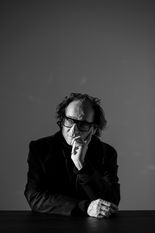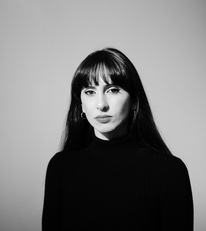
October 7, 2025 | Art & Culture
TR BELOW
IST.FESTIVAL: Rethinking Reality
words Onur Baştürk
photos Courtesy of Istanbul ’74

A meeting point of ideas, disciplines, and emotions — IST.FESTIVAL celebrates its 15th edition this year. Founded in 2010 by Demet Müftüoğlu Eşeli and Alphan Eşeli, the visionary duo behind ISTANBUL’74, the festival has evolved into a cultural dialogue platform that connects Istanbul with the world’s creative minds. Taking place from October 10–12, this year’s theme poses not a statement but a question: “What is Really Real?” We spoke with Demet and Alphan about the evolution of the festival over the past fifteen years, Istanbul’s role within it, and the layered conversations inspired by this year’s theme.
REALITY IS NO LONGER LINEAR—IT UNFOLDS IN OVERLAPPING LAYERS
What does the question “What is Really Real?” mean to you? Why did you choose this theme?
ALPHAN: We’re entering our fifteenth year with a question rather than a slogan: “What is Really Real?” Across this year’s panels, talks, and gatherings, we want to explore how reality is constructed, organized, and sometimes revealed through illusion—especially at the intersection of cinema, art, music, literature, design, and architecture. We value the artists’ new interpretations that allow us to see more clearly and their attempts at “reconstruction.” Instead of chasing final words, we aim to create space for good questions, for doubt, for calm dialogue, and for alternative ways of seeing. In a time when deepfakes and performative noise dominate the landscape, we hope the conversations that emerge this year will be both thought-provoking and inspiring.
How is the concept of “reality” being discussed today in art, music, and design?
DEMET & ALPHAN: Today, reality is questioned not merely as representation, but as an experiential structure. In art, the viewer is no longer a passive observer but part of the work—sometimes even its carrier. In music, beyond the divide between analog and digital or live and recorded, what’s being examined is the bond between sound and presence itself. Experiencing a live performance has become one of the truest forms of reality. In design, AI-driven aesthetics and craftsmanship now coexist on the same surface. Reality is no longer linear—it unfolds in overlapping layers that can contradict or complete each other. Perhaps the core issue is this: reality has become a mode of production. What we choose to reveal, what we conceal, and what we render visible... Art, music, and design are no longer just fields of creation; they are shared grounds for collective reflection on these choices.
THE FESTIVAL HAS GROWN NOT ONLY AN IDENTITY BUT ALSO A MEMORY
Looking back, how has IST.FESTIVAL evolved since its inception?
DEMET & ALPHAN: When we started fifteen years ago, our vision was never just to create a festival. We wanted to build a space where Istanbul’s creative energy could connect with the world—a platform for new encounters between artists, thinkers, musicians, and designers. That founding idea still guides us, but its evolution has been richly layered. Each year, the festival has redefined its relationship with the city and its people. Sometimes it began with a street, a silence, or a question. Now, when we look back, we see that IST.FESTIVAL has grown not only an identity but also a memory. The relationships forged along the way, the collective productions, the ties we’ve built with Istanbul’s many layers—all of these form the essence of the festival. The one thing that has never changed is this: we keep asking questions—of ourselves, our time, and the meaning of art.
Over fifteen years, what moments have challenged you the most, and which ones have made you proudest?
DEMET: Courtney Love’s performance at Liman Lokantası and Thurston Moore’s concert with KONSTRUKT are among the moments we’ll never forget. The most meaningful experiences always emerged from unexpected encounters. And this year’s collaboration with Financial Times was another milestone—an important step that strengthens Istanbul’s place on the global cultural map.
This year’s lineup includes Jeff Koons, Kid Cudi, Inez & Vinoodh, and Stefan Sagmeister. How do you approach participant selection? What are your criteria?
DEMET: It doesn’t begin with a strict selection—it begins with a sense of encounter. What matters is not only who joins, but the ideas that bring them together and the kind of dialogue that can emerge. We invite figures who are not only pioneers in their fields but also capable of engaging with other disciplines, with the city, and with each other. Another key factor is how that person might interact with Istanbul. Some are meeting the city for the first time, while others are deepening long-standing connections. In that shared space, we all find new opportunities to think and create.
The festival program spans art, music, gastronomy, and cinema. What inspired you to bring such diverse disciplines under one roof?
DEMET & ALPHAN: Life itself doesn’t fit into a single discipline—and in a city as layered as Istanbul, the festival couldn’t either. When all these elements come together, they form a shared field of experience.
ISTANBUL EXISTS IN THOSE IN-BETWEEN SPACES
What role does Istanbul play in the festival? How does the city’s spirit shape the content?
DEMET: Istanbul is the festival’s home and its infinite source of inspiration. The city’s real impact is not so much in the planned content, but in how that content is experienced. A sound, a word, a work of art can transform when it encounters the city. That’s why we prefer to be in dialogue with Istanbul rather than try to define it.
How do you see Istanbul’s place in the global art and culture scene, and what role does IST.FESTIVAL play in that context?
DEMET: Istanbul is far more than a geographical crossroads—it’s a living archive and a continuously evolving cultural force. The global art world today is increasingly open to listening beyond the traditional centers, to what happens in between. And Istanbul exists precisely in those in-between spaces. The festival’s contribution lies in being part of that uniqueness—turning Istanbul into a living experience for global artists and thinkers. Perhaps its greatest value is not just in telling the city’s story, but in creating new narratives with it.
And how do you imagine the future of IST.FESTIVAL?
DEMET & ALPHAN: We imagine it evolving into an even more layered and resonant voice—not just in terms of content, but geographically, intellectually, and emotionally. We want to expand the dialogue to new places and stories, to open space for more international collaborations, and to let the spirit of the festival echo beyond Istanbul—while always staying true to its soul.

Fikirlerin, disiplinlerin ve duyguların kesiştiği bir alan: IST.FESTIVAL bu yıl 15’inci yaşını kutluyor. 2010'da ISTANBUL’74 kurucuları Demet Müftüoğlu Eşeli ve Alphan Eşeli tarafından başlatılan festival, o günden bu yana İstanbul’u dünyanın yaratıcı isimleriyle buluşturan bir kültürel diyalog platformuna dönüştü. 10–12 Ekim tarihleri arasında gerçekleşecek bu yılki festivalin teması, “What is Really Real?”. Festivalin kurucuları Demet ve Alphan ile 15 yılın birikimini ve bu yılın teması etrafında şekillenen diyalogları konuştuk.
“What is Really Real?” sizin için ne ifade ediyor?
ALPHAN: IST.FESTIVAL on beşinci yılına bir slogandan çok bir soruyla giriyor: “Hakiki Gerçek Nedir?” Bu yıl özellikle paneller, söyleşiler ve buluşmalarda sinema, sanat, müzik, edebiyat, tasarım ve mimarinin kesişiminde, gerçekliğin nasıl kurulduğunu, düzenlendiğini ve kimi zaman yanılsamalarla belirdiğini birlikte konuşmayı amaçlıyoruz. Panellerde son sözlerden çok iyi sorulara, kuşkuya, dingin bir diyaloğa ve farklı görme ihtimallerine yer açmayı hedefliyoruz. ‘Deep Fake’lerin ve performatif gürültünün öne çıktığı bir dönemde, bu panellerde doğacak diyalogların ilginç ve ilham verici olmasını umuyoruz.
“Gerçeklik” kavramı sizce sanat, müzik ve tasarım alanlarında bugün nasıl tartışılıyor?
DEMET & ALPHAN: Bugün gerçeklik meselesi, bu üç alanda da salt temsilin ötesinde, deneyimin yapısı üzerinden sorgulanıyor. Sanatta izleyici artık sadece bir gözlemci değil, işin bir parçası, bazen de taşıyıcısı. Müzikte ise analogla dijitalin, canlı ile kayıt arasındaki farkın ötesinde, sesin mevcudiyetle kurduğu bağ tartışılıyor. Bir performansı o an dinliyor olmak, artık gerçeğe en yakın deneyimlerden biri haline geldi. Tasarımda ise yapay zekâ
estetiğiyle el işçiliği aynı yüzeyde bir araya gelebiliyor. Gerçeklik, artık doğrusal bir çizgi değil; üst üste binen, bazen birbirini çürüten, bazen tamamlayan katmanlar halinde yaşanıyor. Belki de asıl mesele şu: Bugün gerçeklik bir tür üretim biçimi hâline geldi. Hangi parçayı gösterdiğimiz, neyi sakladığımız, neyin görünür kılındığı... Dolayısıyla sanat, müzik ve tasarım artık sadece alanlar değil; bu tercihler üzerine birlikte düşünme imkânı sunan ortak zeminler.
Geriye dönüp baktığınızda, IST.FESTIVAL’in başlangıçtan bugüne nasıl bir yol kat ettiğini görüyorsunuz?
DEMET&ALPHAN: 15 yıl önce yola çıkarken hayal ettiğimiz şey, sadece bir festival yaratmak değildi. İstanbul’un yaratıcı enerjisini dünya ile paylaşabilecek bir alan kurmaktı. Sanatçılar, düşünürler, müzisyenler ve tasarımcılarla birlikte bu şehirde yeni karşılaşmalar yaratabilecek bir zemin... O ilk fikir hâlâ bizimle; ama geçirdiği dönüşüm çok katmanlı. Her yıl festival, şehirle ve insanlarla kurduğu ilişkiyi yeniden tanımladı. Bazen bir sokak, bazen bir sessizlik, bazen bir sorudan yola çıktık. Şimdi geriye dönüp baktığımızda, bu festivalin bir kimliği kadar bir hafızası da olduğunu görüyoruz. Bu yolculuk boyunca kurulan ilişkiler, kolektif üretimler, İstanbul’un farklı katmanlarıyla kurduğumuz bağ... Bunların her biri bizim için festivalin asıl özünü oluşturuyor. İlk günden bugüne değişmeyen tek şey ise şu: Soru sormaya devam etmek. Kendimize, çevremize, zamana ve sanatın anlamına dair.
15 yıl boyunca festival kurucuları olarak sizi en çok zorlayan ve en çok gururlandıran anlar neler oldu?
DEMET: Courtney Love’ın Liman Lokantası’ndaki performansı ve Thurston Moore’un KONSTRUKT ile konseri akıllarımızda özel yer tutuyor. En değerli anlar hep beklenmedik karşılaşmalardan doğdu. Ayrıca bu yıl Financial Times ile yaptığımız iş birliği, İstanbul’u global haritada güçlendiren önemli adımlardan biri oldu. Bu yıl Jeff Koons, Kid Cudi, Inez &Vinoodh, Stefan Sagmeister gibi isimler var.
Katılımcı seçim süreci nasıl işliyor? Hangi kriterler belirleyici oluyor?
DEMET: Aslında süreç bir seçkiden çok bir karşılaşma hissiyle başlıyor. Kimlerin geldiği kadar, nasıl bir düşünceyle bir araya geldikleri, nasıl bir diyaloğun kurulabileceği daha önemli. Davet ettiğimiz isimlerin sadece kendi alanlarında öncü olmaları değil, farklı disiplinlerle, şehirle ve hatta birbirleriyle nasıl temas kurabilecekleri de belirleyici oluyor. Bizim için kıymetli olan bir başka şey, o kişinin İstanbul’la nasıl bir etkileşime girebileceği. Bazı katılımcılar bu şehirle ilk kez tanışıyor, bazıları ise yıllardır kurdukları bağları başka bir boyuta taşıyor. Bu ortak alan, hepimiz için yeniden düşünme ve üretme imkânı yaratıyor.
Programda disiplinlerarası bir çeşitlilik var. Tüm bu alanları tek bir çatı altında buluşturma motivasyonunuz neydi?
DEMET&ALPHAN: Hayatın kendisi tek bir disipline sığmıyor! İstanbul gibi çok katmanlı bir şehirde festivalin de öyle olması gerekiyordu.
İstanbul’un bu festivaldeki rolü nedir? Şehrin ruhu, festival içeriklerine nasıl yansıyor?
DEMET: İstanbul festivalin evi ve sonsuz ilham kaynağımız. İstanbul’un asıl etkisi, planlanan içerikten çok, içeriklerin nasıl deneyimlendiğiyle ilgili. Bir ses, bir söz, bir yapıt bazen şehirle karşılaştığında beklenmedik bir şeye dönüşüyor. O yüzden İstanbul’u tanımlamaktan çok, onunla konuşmayı tercih ediyoruz.
İstanbul global kültür sahnesinde nasıl bir pozisyon alıyor? IST.FESTIVAL’in buna katkısı nedir?
DEMET: İstanbul, coğrafi bir kavşaktan çok daha fazlası; tarihsel bir hafıza ve sürekli dönüşen bir kültürel enerji. Bugün global sanat dünyası, sadece merkezleri değil, aradaki alanları da dinlemeye daha açık. İstanbul da tam bu aralıklardan birinde duruyor. IST.FESTIVAL’in katkısı tam da bu eşsizliğin bir parçası olabilmek. İstanbul’u global sanatçılar ve düşünürler için yaşayan bir deneyime dönüştürmek. Belki de festivalin asıl katkısı; İstanbul’u sadece anlatmak değil, onunla birlikte yeni anlatılar üretmek.
IST.FESTIVAL’in geleceğini nasıl hayal ediyorsunuz?
DEMET&ALPHAN: Önümüzdeki yıllarda daha çok sesli, daha katmanlı bir yapıya evrilmesini hayal ediyoruz. Sadece içerik anlamında değil; coğrafi, düşünsel ve duygusal anlamda da daha fazla alana dokunan, yeni hikâyelere alan açan bir yapı. Uluslararası çapta daha fazla üretime alan tanıyan; İstanbul’un dışında da farklı şehirlerde yankı bulan bir festival düşüncesi bizi heyecanlandırıyor. Ama özünde festivalin ruhunu koruyarak elbette.























